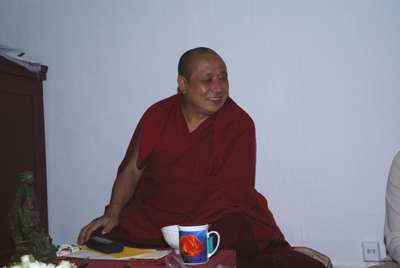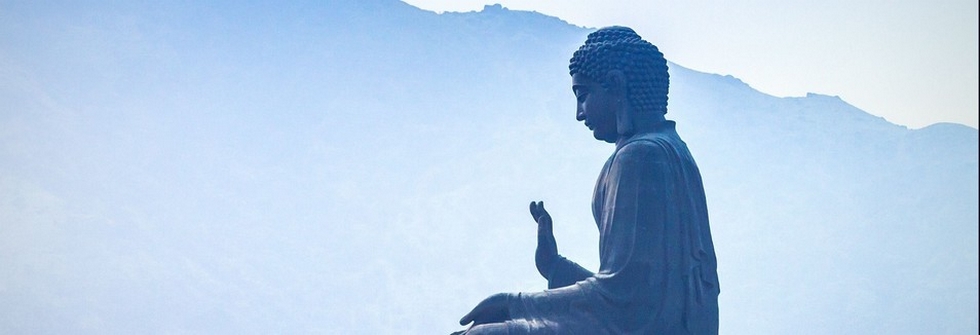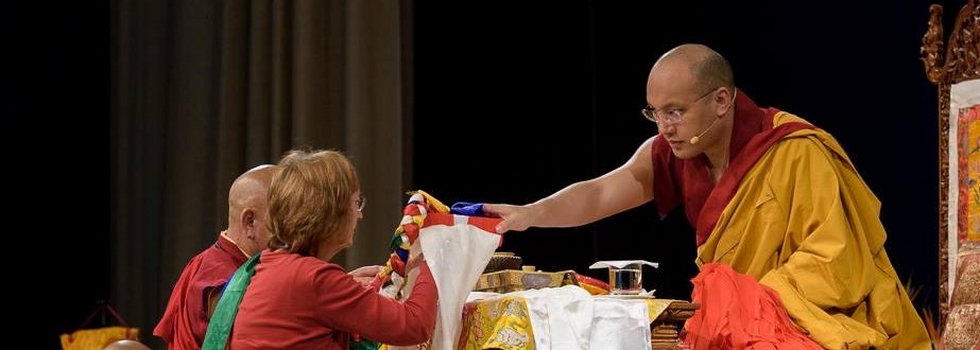Developing and Manifesting Compassion and Loving Kindness

Venerable Chöje Lama Phuntsok
Developing and Manifesting Compassion and Loving Kindness
Teachings presented during the Manjushri Retreat at
Karma Chang Chub Choephel Ling, Heidelberg, in October 2009.
"Until I awaken, I take refuge in
The Buddha, the Dharma, and the Supreme Assembly.
Through the goodness of generosity and other virtues
May I awaken fully in order to help all beings. "
"Namo Guru Manjushri Ye "
A Bodhisattva is someone who aspires and practices to attain liberation for the benefit of all living beings. The three qualities of a Bodhisattva are: He or she never grows tired or becomes weary of working to accomplish his or her wish to liberate beings from suffering, no matter how hard it might be; he or she never hesitates helping other beings, no matter how many there are; a Bodhisattva never stops helping others, no matter how long it will take. Ordinary people think that these qualities are very hard to accomplish. To even be able to approach the possibility of having these characteristics of a Bodhisattva, we have to start by generating and developing loving kindness and compassion. Loving kindness and compassion are the origin and cause for becoming a Bodhisattva. It is inconceivable for somebody who has no loving kindness and compassion to be a Bodhisattva.
There are three categories of compassion, snying-rje-gsum. The first is sems-cän-la-dmigs-pa 'i-snying-rje, 'compassion regarding sentient beings. ' The second is chös-la-dmigs-pa 'i-snying-rje, 'compassion regarding the Dharma. ' The third is dmigs-pa-med-pa 'i-snying-rje, 'compassion without a reference. ' It is necessary to begin meditating love and compassion by practicing the first kind.
Our compassion always necessitates an object, otherwise it isn 't possible to meditate compassion. Thinking of the living beings that are the object of our compassion, we reflect how much they suffer and have the wish that they be free of their suffering and pain. This is what having compassion means. When hearing of suffering, Buddhists automatically think of the many beings living in the six realms of samsara, 'conditioned existence. ' The six classes of beings, 'gro-ba-rigs-drug, are categorized according to the intensity of suffering that they experience. They are: gods, demigods, human beings, animals, hungry ghosts, and hell beings.
The word "suffering " is a general term. There are a great number of ways to suffer, stronger and weaker. There are three categories of suffering, sdug-bsngäl-gsum. The first is sdug-bsngäl-gyi-sdug-bsngäl, 'suffering of suffering. ' The second is 'gyur-ba 'i-sdug-bsngäl, 'suffering of change. ' The third is khyab-pa- 'du-byed-kyi-sdug-bsngäl, 'all-pervading suffering of conditionality. ' These three kinds of suffering are different. I will speak about them shortly.
Suffering of suffering means another misery is heaped on suffering that one already endures. Since everything is transient, one experiences suffering of change when happiness ends and then one suffers again. All-pervading suffering is very subtle and permeates every composite phenomenon. Who experiences these three kinds of suffering? Living beings. Some living beings experience very intense suffering, some experience happiness and suffering alternately, and others only experience all-pervading suffering. Those beings of the six classes who experience the most intense pain, which is suffering of suffering, are hell beings and hungry ghosts. Animals also experience suffering of suffering, but not as strongly as those two classes of beings. Humans mainly experience suffering of change. Gods and demigods go through all-pervading suffering. So, that is the reason the six classes of beings are categorized in that order.
If we think of living beings, some suffer quite a lot, others experience happiness, too, while some only experience subtle suffering. But, humans also experience suffering of suffering. There are rather poor countries, and its peoples suffer tremendously. Furthermore, in many countries there are people who don 't have a job and who aren 't cared for. When they become sick, suffering is heaped upon their misery, which is suffering of suffering, sdug-bsngäl-gyi-sdug-bsngäl. People living in poor countries feel suffering of suffering more strongly, where one catastrophe follows another. Since we can 't perceive hell beings and hungry ghosts, we aren 't really sure what they go through. Since we want to gain certainty of what suffering of suffering means, it 's no use spending much time wondering what beings living in other realms of existence experience. So, looking at people we know or meet and thinking about how distraught people living in poorest countries feel, we see that there is suffering of suffering in the realm of human beings. Of course, many people have a happy life, but it changes and when it does, they face problems and experience 'gyur-ba 'i-sdug-bsngäl. You probably all have experienced suffering of change. No?
Human beings also experience khyab-pa- 'du-byed-kyi-sdug-bsngäl, 'all-pervading suffering of conditionality. ' Let us imagine somebody who is very rich and who tells us, "Oh, I am so well off and am so happy. " Since it is so subtle, this person is also subject to all-pervading suffering but doesn 't notice. We find all three categories of suffering in the human realm.
Since we have the wish to be able to protect and liberate living beings from the three kinds of suffering, we meditate compassion. Our aspiration can be so extensive that it embraces all living beings, but we won 't be able to actually put our wish into practice. We will probably only be able to focus our attention on one, two, three, maybe ten, or maybe one hundred people. Doing this is practicing the first kind of compassion, sems-cän-la-dmigs-pa 'i-snying-rje, 'compassion regarding sentient beings. ' If we try to protect those who suffer from the suffering of change, we can speak to them about the Dharma and what their misery means. Doing this is practicing the second kind of compassion, chös-la-dmigs-pa 'i-snying-rje, 'compassion regarding the Dharma. ' Those persons who suffer from all-pervading suffering are those who say, "Oh, I 'm so well off. I 'm so lucky. I 'm so happy. " They say this because they cling to a self. If we try to help them, we can speak to them about impermanence. Doing this is practicing the third kind of compassion, dmigs-pa-med-pa 'i-snying-rje, 'compassion without a reference. '
Meditating compassion isn 't a matter of formal practice, rather, it means being active. If we want to help beings who are experiencing suffering of suffering, we can give those persons who are hungry something to eat or we can give medicine to those who are sick. We can introduce those persons who are experiencing suffering of change to the path of Dharma. Just knowing that there is a way to overcome their suffering is already a great help to them and makes them happy.
We can 't help persons who suffer from all-pervading suffering and who are very well off by giving them food or medicine or by introducing them to the path of the Dharma. Because they are very proud, they wouldn 't be interested anyway. We can only help them by telling them about impermanence. We shouldn 't be too demanding and speak to them about emptiness, rather, just about the transient nature of all things.
Merely meditating compassion is useless. Developing compassion means first giving rise to the wish to protect all living beings from the three kinds of suffering. It is an aspiration. Practicing compassion means helping them with respect to their situation and according to the suffering that they are experiencing. Giving somebody who is rich 100.- Euro isn 't what practicing compassion is about, because that person already has enough and isn 't in material need. As said, we would be helping somebody who is rich by making him or her aware of impermanence. Having compassion means having the wish to free others from suffering.
We looked at the three categories of suffering and the three compassionate ways to help people become free. They are the definitions of compassion of aspiration and compassion of application. We looked at the suffering that human beings experience, but animals also suffer. As said, we can 't perceive hungry ghosts and hell beings, therefore we can have doubts whether they are in misery, but we can see animals. It 's needless to say that it would be useless to give money to a starving animal. We should alleviate its suffering appropriately and correctly. If we see a hunger-stricken dog and have compassion, we would give it something to eat. We also need to protect animals. Being compassionate towards humans and not towards animals is one-sided compassion. Some people melt with compassion when they see a poverty-stricken person but ignore a suffering animal. Our compassion isn 't restricted but includes all animals, too. We need to help them, just like we help human beings.
Somebody who has been hit by a sharp weapon probably has a wound. It may happen that we run into trouble trying to help him, because he might get mad and hit us. But, what do we do to animals? Instead of protecting and alleviating their suffering, we hurt them, kill them, and chop them into pieces to eat them. They can 't defend themselves. Instead of ignoring or accepting that they are butchered and slaughtered, we should pay ransom for their lives and set them free. We would be practicing compassion by buying just one living animal from a butcher or from a slaughterhouse and setting it free. If we want to practice and develop compassion, we must include animals and not just think of humans. Should we ignore animals, we would be prejudiced, one-sided, narrow-minded, and this isn 't what being compassionate means.
Living beings are the object of our compassion, and we are the ones who are compassionate towards those who suffer. Being compassionate means wishing and protecting living beings from suffering. Giving rise to the wish to help all living beings become free of suffering and putting our wish into practice is the way of a Bodhisattva. Then we are Bodhisattvas.
Does a Bodhisattva suffer? What do you think?
Student: "Yes. Noble Chenrezig shed tears. "
Lama Phuntsok: Do Bodhisattvas suffer immensely? I should formulate it differently: Yes, a Bodhisattva suffers immensely. Why? Although he helps, there are more and more living beings who suffer, so he suffers more and more. Noble Chenrezig shed tears, and his tears are an expression of suffering. Let us not look at others now but see how the three kinds of suffering apply to us.
Suffering of change is hardest for me to bear. I 'm an ordained monk and people often think that I don 't suffer because I 'm free and have no worldly concerns. But I suffer because I 'm responsible for 100 monks and it 's up to me to appease their suffering. I 'm also subject to all-pervading suffering. At the moment, I 'm healthy and everything is going well, but it 's being proud to say, "Oh, I am well. " I can catch a cold when I go out in the rain and then all-pervading suffering once again silenced my pride. All of us are subject to the three kinds of suffering, but usually we aren 't aware of this.
There was a woman in Thailand who told me, "I 'm a good Dharma practitioner. I do my best. " I responded, "But, it 's necessary to practice renunciation to be a good Dharma practitioner. " She replied, "One has to suffer in order to develop renunciation. But I don 't suffer, so how should I develop renunciation? " I asked her, "Why do you say that you don 't suffer? " She answered, "I 'm rich and have enough money. I 'm single and have no children. I can buy anything I want. I have enough to eat. I don 't suffer. " She wasn 't aware of the fact that she, too, is subject to all-pervading suffering. I later taught a short text by Acharya Nagarjuna over a period of 15 days that deals with suffering. This woman took part in the course.
Nagarjuna taught that the essence of suffering is a feeling of being unhappy. One suffers the moment one feels uncomfortable or experiences something unpleasant. For example, one doesn 't feel good when one is hungry due to having missed breakfast, which is suffering. Having a headache means feeling unwell, which is suffering. One doesn 't feel good if one hasn 't slept for two nights, which is suffering. There isn 't anybody who doesn 't experience suffering, but people don 't think about this when they are happy and when things are going well for them. For example, we feel uncomfortable when the mailman brings the electricity bill at the end of the month. What happens when we are on the road and our car runs out of gas? We don 't feel good when we have less money in our wallet after having bought gas. These are all forms of suffering. We only need to notice. There 's no way around it: We 're all subject to suffering in various forms and in different ways. Giving rise to compassion is the skilful means to eliminate all kinds of suffering.
Only in emptiness there is no more suffering. There is no suffering in emptiness. Do you think that suffering and emptiness coexist? There is no suffering and also no joy in emptiness. Practicing compassion in emptiness makes no sense. It 's meaningless to practice compassion in emptiness, because there 's no suffering in emptiness. Compassion is only relevant with respect to living beings and is only meaningful if one aspires and practices to protect them from suffering.
Noble Chenrezig is the Bodhisattva with the most compassion, which is why he has four arms. Buddhists in China worship Chenrezig in the female form. In Nepal, Tibet, and India, he is imagined in the male form. He has these aspects. Being the manifestation of greatest compassion, sngying-rje-chen-po, women can imagine him in the female form and men can imagine him in the male form. It doesn 't make a difference, because whoever awakens great compassion within becomes Noble Chenrezig, sPyän-räs-gzigs in Tibetan, Avalokiteshvara in Sanskrit. It doesn 't matter if we are a man or woman when we meditate Chenrezig, because he is the representative of great compassion.
There has been much discussion on suffering now, which might make many students feel uncomfortable. But we need to be aware of our own suffering. Then we can feel empathy and can generate the wish that no one suffers and that all three kinds of suffering become exhausted and cease. How can we possibly help others, seeing we are beginners on the path of Dharma and have problems dealing with our own suffering? As beginners, we first give rise to the pure mind by having the heart-felt aspiration and wish, "May I be able to help all living beings become free of suffering and pain. " Then we do what we can and thus become a Bodhisattva. How do you see this? Maybe you have questions.
Student: "There is a difference between paying the electricity bill and killing living beings. Isn 't it totally different to unconsciously and unwillingly create suffering when I kill hundreds of mosquitoes or worms while driving my car down the street? It makes me sad, because I do not want to do this. "
Lama Phuntsok: It 's good contemplating cause and results in this way. Thinking that one used electricity and needs to pay the bill is a good way of being aware of cause and results. It 's not so painful for people here to pay their electricity bill, but in Nepal people who have few means suffer when the electricity bill comes. Of course, everyone sees suffering differently. Killing many insects while driving the car is another matter. Driving back and forth is more critical in districts in Asia where streets aren 't paved. It rains strongly in Asia, and one kills even more insects and worms when one drives through the puddles. It is a step knowing that one is killing tiniest insects that one doesn 't see while driving. Thousands of cars drive on paved freeways and roads, so there probably aren 't that many living beings on the streets here anymore. Whether there are cars or not, insects are in the sky.
Many little animals live in gardens, and the only purpose of our garden is to make us happy. Or? We also kill many little animals when we do gardening, so we should refrain from doing this. Yet, we suffer when we have to pay a gardener we hire. I think it 's good to let a garden grow on its own and freely, instead of having lots of flowerbeds. Having one pretty tree in the garden is good for the air, a little pond and a lawn attract many tiny animals. We don 't have a garden at Lekshey Ling in Kathmandu, so I don 't have much experience, but, because we have a different sanitation than in the West, we have problems with insects in our bathrooms. Furthermore, we shouldn 't drink too much bottled water, because so many insects are harmed when winning the water and many animals are hurt by the discarded plastic bottles. Filtering water also kills many insects, so we should be careful there.
Student: "This means that whatever we do causes living beings to suffer. "
Lama Phuntsok: Yes, since this is true, the circle of conditionality is called "samsara, " which is marked by unremitting and incessant suffering. Thinking about this again and again, we try to help sentient beings instead of hurting them. We have to eat, otherwise we suffer from hunger. Also, the microorganisms living in our body will be unhappy if we don 't nourish our body. We therefore need to eat well, which harms others when looking outside but benefits others when looking inside. We are in samsara and every one who is in samsara suffers, whoever and wherever they are. Trying to have a pure mind and trying to develop a good heart by awakening loving kindness and compassion means that we are at least doing a little bit. Let me add that it 's very important to contemplate our own situation and the defects of samsara.
The time has run out and our seminar has come to an end, so again we experience the suffering of change. I hope that these teachings are beneficial for you. Being together like this and in such a pleasant way is a sign that we have a karmic connection with each other. I truly hope that we meet again here in the future to speak a little bit more about the Dharma and to practice together. I make wishing prayers that we attain perfect Buddhahood together and then rejoice together. Jetsün Milarepa said: "I pray that the meditator in the cave and his sponsor attain liberation together. That is my wish. " I also wish that we all attain Buddhahood together. It 's very important to have wishes like this.
There is now a new little Lekshey Ling in the world - a Lekshey Ling baby. It is a Karma Kagyü Center, and our Lama is His Holiness the Gyalwa Karmapa, Ogyen Trinley Dorje. I hope that we all work together. Kamalashila Institute is the mother of the Karma Kagyü Centers in Germany, and a mother needs to have many children. Having many children makes the mother greater. Things are only big in relation to things that are small, so in order to make something big, many small things are needed. There are only a few small Dharma centers in Germany, so we should give birth to many small Dharma centers. And that is why Anneke has brought a new baby to the world in Weißenthurm.
Lama Dorothea Nett: "Thank you, most Venerable Lama Phuntsok. We also want to thank Hannelore for her fabulous translation of the teachings. "
Hannelore: "Thank you for your patience. "
Lama Phuntsok: Everything is impermanent, and tomorrow morning I will leave. One of the four things to reflect when contemplating impermanence is that everything that comes together separates. It 's the same for us. We met and part again. I truly hope we meet again here next year. Thank you very much. Let us now recite the dedication prayers together.
Dedication Prayers
Through this goodness, may omniscience be attained
and thereby may every enemy (mental defilement) be overcome.
May beings be liberated from the ocean of samsara
that is troubled by waves of birth, old age, sickness, and death.
By this virtue may I quickly attain the state of Guru Buddha, and then
lead every being without exception to that very state!
May precious and supreme Bodhicitta that has not been generated now be so,
and may precious Bodhicitta that has already been never decline, but continuously increase!
May the life of the Glorious Lama remain steadfast and firm.
May peace and happiness fully arise for beings as limitless in number as space is vast in its extent.
Having accumulated merit and purified negativities, may I and all living beings without exception
swiftly establish the levels and grounds of Buddhahood.
The Long Life Prayer for H.H. the XVIIth Gyalwa Karmapa, Ogyen Trinley Dorje
Naturally arising Dharmakaya, unchanging and ever-present,
Karmapa, you appear as the form kayas ' magical illusions.
May your three secret vajras remain stable in the realms
And your infinite, spontaneous activity blaze in glory.
Photo of Venerable Chöje Lama Phuntsok offering teachings at Karma Lekshey Ling in Weißenthurm, Germany, in October 2009. Wonderful thanks to Lama Dorothea Nett for having organized the most auspicious event of the teachings in this article in Heidelberg, and special thanks to Michael Slaby for having recorded them and for having made the CD available to us. Awesome photo taken by Ursula Bollinger from Bietigheim and generously offered for Lama Phuntsok 's article here. In reliance on the fabulous simultaneous translation of Tibetan into German by Hannelore Wenderoth, these teachings were translated into English and arranged by Gaby Hollmann, responsible and apologizing for any mistakes. All persons and institutes mentioned here have copyright for their contribution. Lama Phuntsok 's article is made available by the Dharma Download Project of Khenpo Karma Namgyal at Karma Lekshey Ling Institute in Kathmandu, by Karma Chang Chub Choephel Ling in Heidelberg, and by Karma Sherab Ling in Münster for personal use only; it may not be reproduced in any form nor be published. Munich, 2009.















